december reading recap 📚
+2024 in review. as seen on my shelf #5
I do feel comforted to discover I'm not the only person on this earth who has no idea what life is for, nor what is to be done with all this time aside from filling it ― Zadie Smith, Intimations
My one reading goal for 2024 was to read less. In 2023, I read 164 books; last year, I read 124. I think I did good. I can’t quite figure out where my head was at this time last year, but whatever was happening, it prompted me to read 22 books in January and 18 the month after. March brought on a reading slump that took months to shake. I had gorged on fiction, and soon I was full. I remember looking at my bookshelves, heavy with unread books, and thinking, What if I’m done? What would I do with all these books?
Summer rolled in, the days got longer, and paperbacks found their way back into my hands. On a five-hour flight from Portland to DC, I read The Guest cover to cover. That’s when I knew—I was back, and not a moment too soon. All was right with the world again.
I didn’t have a stellar reading year, further confirmed by how easily I put together my top 10 books. Looking through my Storygraph, the books I read when I was “off”, I experienced with dispassionate remove, a reflection of my state of mind at the time. Novels like Hernan Diaz’s Trust, which I would ordinarily devour, took me days and days to get through. Reading, for me, is best done quickly and intensely. I hate for things to be too spread out.
I also spent far too much time asking myself the sort of self-indulgent questions I assume only people who read over 50 books a year ask: What sort of reader am I? What does it say about me that I refuse to listen to audiobooks or read digital books? Far too much time was spent on this app. It’s true that the more I’ve read, the more “literary” my taste has become. Over the past year, I’ve gravitated towards more translated fiction, modern classics, and prize list books. Still, airport thrillers, cheesy rom-coms, and the occasional romantasy, when spread out, have always served as welcome palate cleansers. Someone once described my reading taste as eclectic. That made me smile. I want to keep reading— all of it, and more of it.
This year, my goal is to buy far fewer books and get through what’s already on my shelf. I spent the last few months manically stocking up on the kind of novels I’d want to reach for this year, so I think I’m all set.
Here are my Top Ten Books of 2024:
Gilead by Marilynne Robinson
Pachinko by Min Jin Lee
Milkman by Anna Burns
Never Let Me Go by Kazuo Ishiguro
In the Dream House by Carmen Maria Machado
The Interestings by Meg Wolitzer
If an Egyptian Cannot Speak English by Noor Naga
Lonesome Dove by Larry McMurty
The Story of a New Name by Elena Ferrante
Demon Copperhead by Barbara Kingsolver
A STORYGRAPH REVIEW
I keep my Storygraph updated pretty religiously, so feel free to follow along if it pleases you!
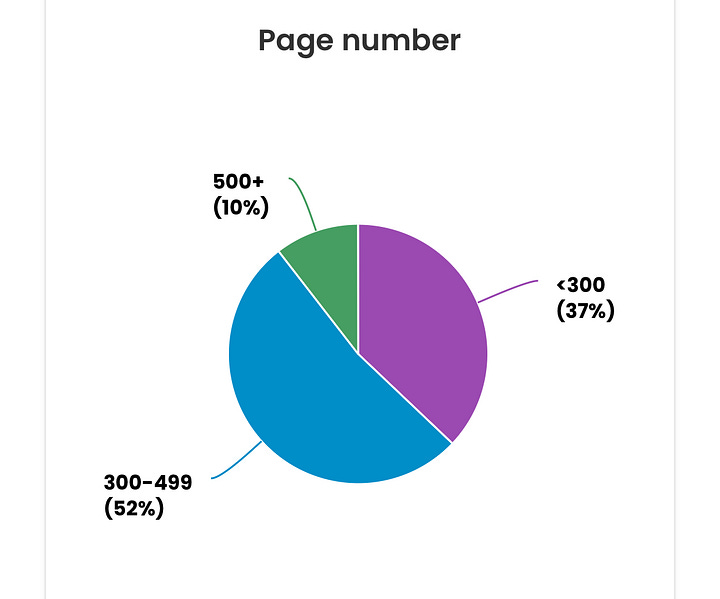
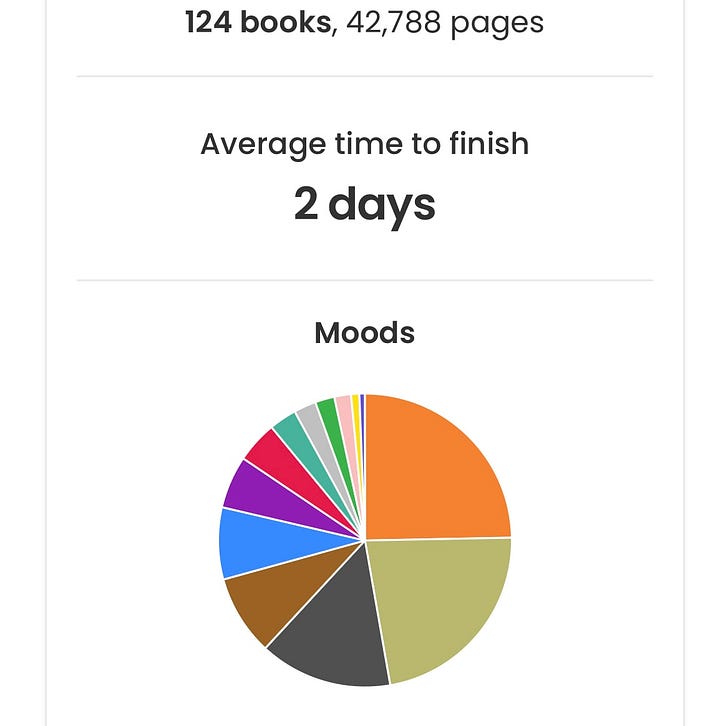
I think it’s wild that 62% of the books I read were between 300 and 500+ pages, and my average time to finish a book is two days. How I do all I do with zero caffeine is a mystery to me.
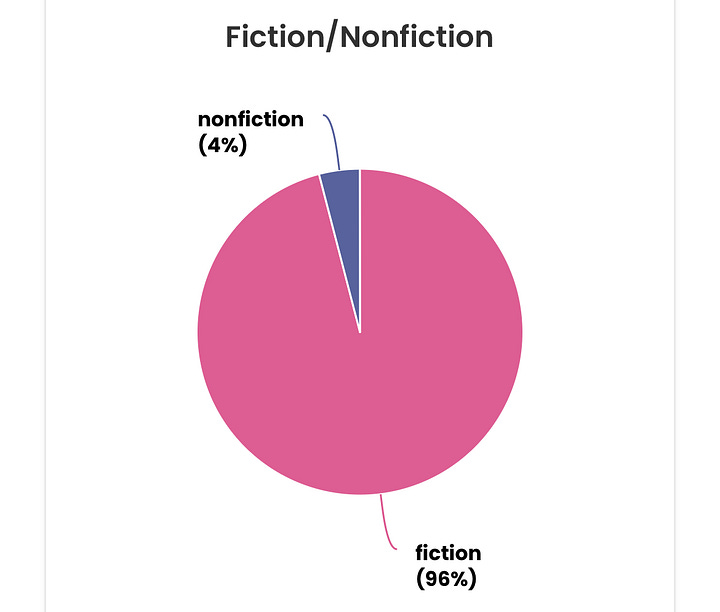
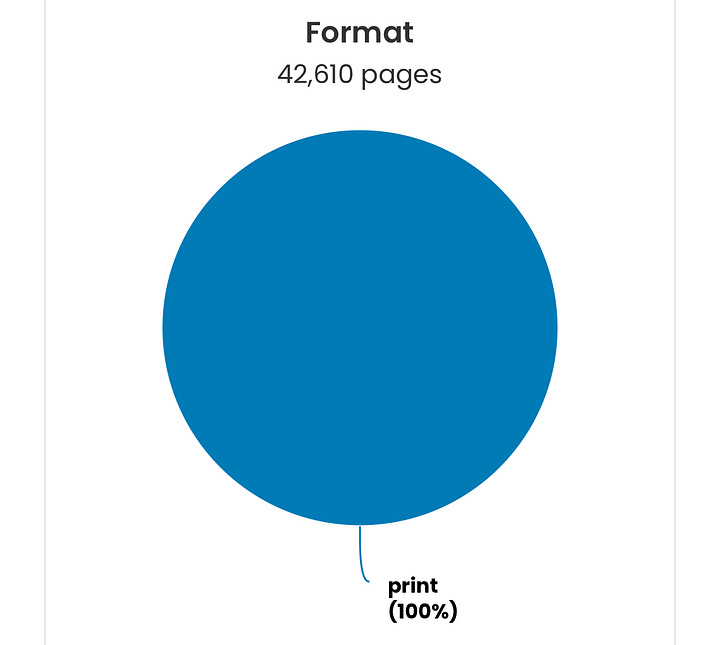
I tried reading one nonfiction book a month last year and failed almost immediately. Hoping my second try does the trick.
Maybe this is the year I finally listen to an audio book. Probably not tbh.
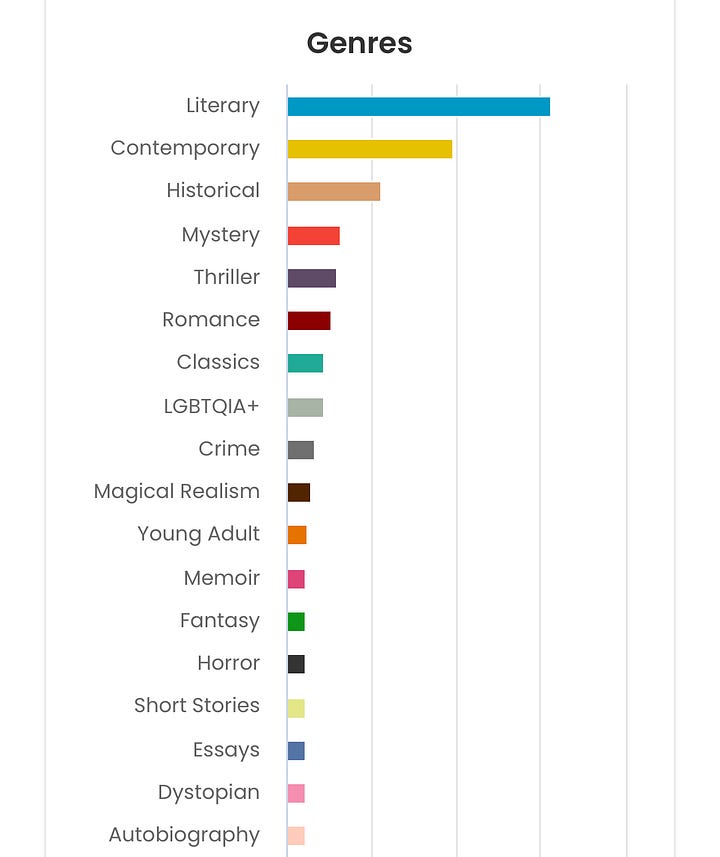
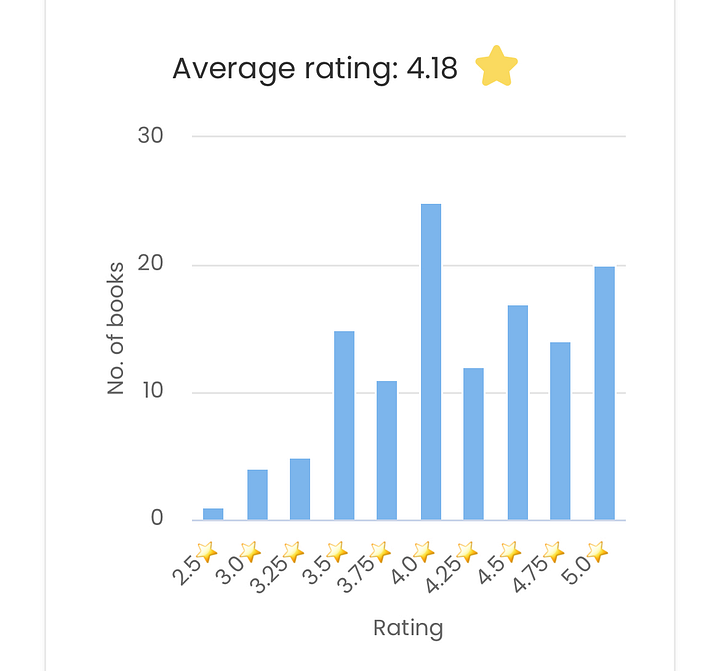
No surprise with my genre breakdown. Hoping to read more classics, horror, and essay collections this year. Also fantasy! Finally going to start The Way of Kings series.
My average ratings should not be this high lol. More 3 stars coming this year.
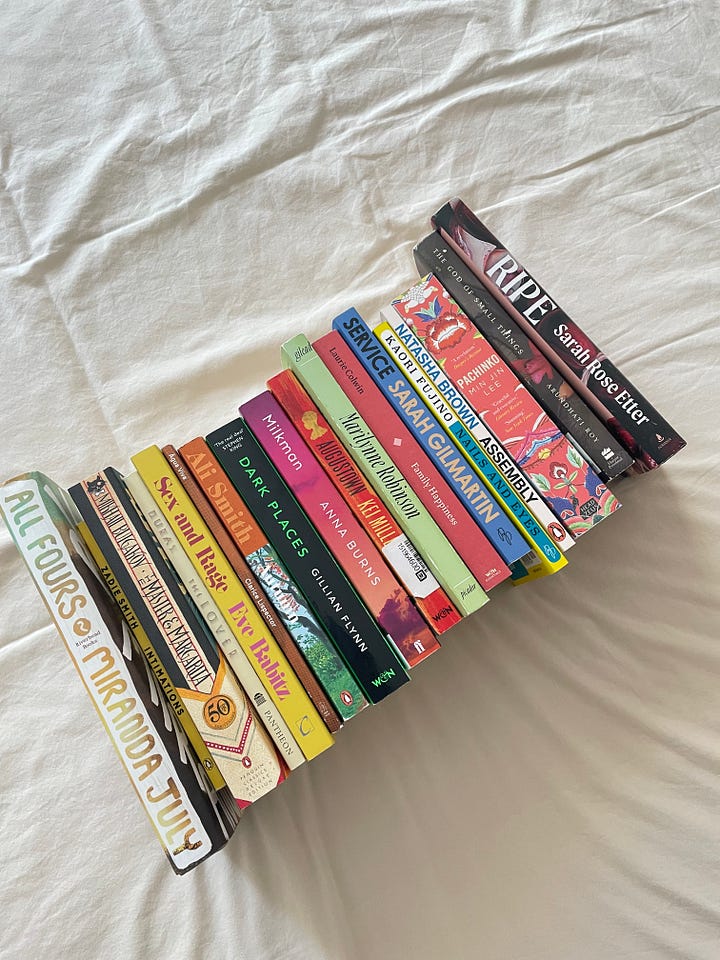
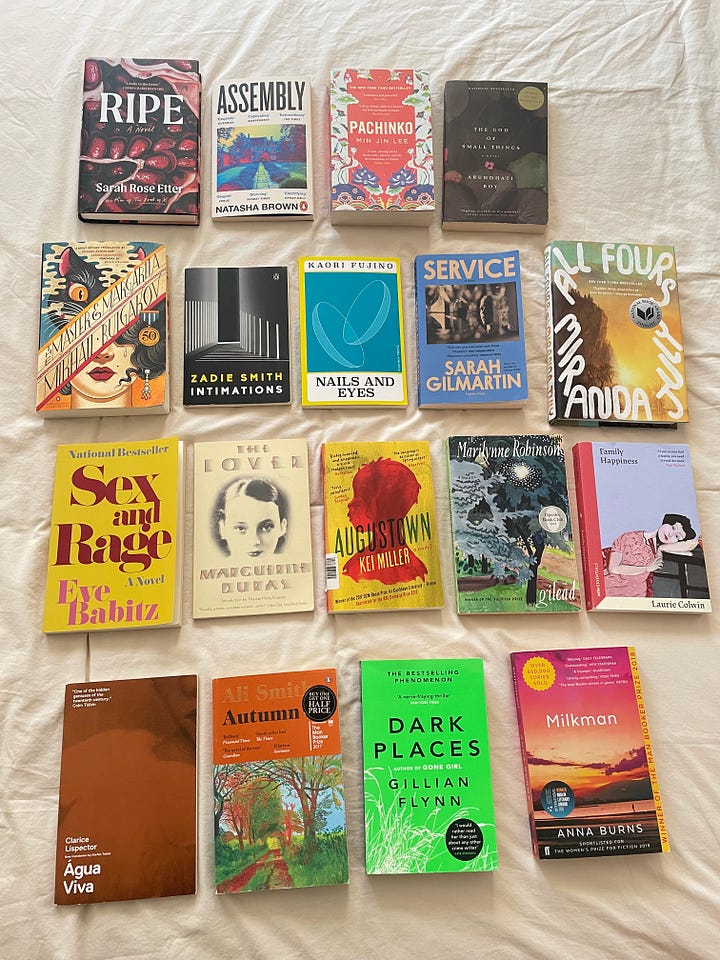
BOOKS I READ IN DECEMBER
Autumn by Ali Smith
My reading this book in the first place can only be ascribed to an unfortunate side effect of spending too much time on Bookstagram and allowing myself to be seduced by pretty pictures. Not only did I purchase this book, but I also foolishly bought the entire Quartet because I had a sneaking suspicion that I wouldn’t enjoy Autumn (I couldn’t get through How To Be Both) but wanted to force myself to read the whole series regardless. What hubris. And now, here we are—me, saddled with three more books I expect to enjoy no more than I did this one. Autumn is about the friendship between a middle-aged woman and an old man who was her childhood neighbor. It is also about Brexit. Apparently. I really couldn’t tell you—I didn’t know what was happening!
Family Happiness by Laurie Colwin
I read this with
for my December book club (not the new one we’re starting together). We both loved it. Check out our conversation below!Milkman by Anna Burns
This book nearly killed me—but in a good way. Here’s what you need to know: there are almost no page breaks, almost no proper nouns, the chapters go on forever, and reading it feels like getting caught up in a claustrophobic anxious spell. It will probably give you a headache, but it won the 2018 Booker Prize, so it might just be worth it. It was for me. In an unnamed Irish city, “middle sister”, our protagonist, is busy attempting to keep her mother from discovering her relationship with maybe-boyfriend, while keeping everyone in the dark about her encounter with Milkman, a maybe high ranking paramilitary member. This is a story about Northern Ireland, about The Troubles, about silence and hearsay, and about the enormous consequences of inaction and deliberate deafness. Milkman is a story about the cloying nature of tyranny. I read Patrick Radden Keefe’s Say Nothing this month—I consider this a perfect companion piece.
Nails and Eyes by Kaori Fujino
I’ve been really into teeny tiny books lately. Nails and Eyes is a collection of three short Japanese literary horror stories, one of which follows a young girl’s sinister obsession with her young stepmother. None of the stories blew me away, but they did sharpen my interest in the literary horror.
Ripe by Sarah Rose Etter
A year into her dream job at a cutthroat Silicon Valley startup, Cassie finds herself trapped in a corporate nightmare. In addition to the long hours, toxic bosses, and unethical projects, she is constantly followed by a miniature black hole that feeds on her ever growing depression and anxiety. I read this book with my best friend, who is currently in a well-paying job she hates. I thought this book was mid at best—she loved it. So much about enjoying literature is about where you’re at in that moment.
Augustown by Kei Miller
One of the reasons I’m excited about the book club with Pandora is that long before I started this newsletter, I was a huge fan of her podcast, Book Chat. Many of the best books I read this year, I discovered through her discussions with Bobby Palmer. Augustown is one of those. Augustown is a magical and haunting novel set in the underbelly of Jamaica. It follows a kaleidoscope of characters—from the blind but all-seeing Ma Taffy, her great-nephew Kaia, and the flying preacher man—as they grapple with race, class, the Rastafari identity, and “the great thing that did not happen.” This book is truly one of a kind. Immediately after I closed the last page, I spent about an hour researching the history of Jamaica, the Rastafari, and Augustown, which is a real place. I was surprised by how much I didn’t know about the history of the Caribbean—something I resolved to remedy in the coming months.
Sex and Rage by Eve Babitz
You know I love me some Eve! So I’m sad to report this was a bit of a flop for me. Clearly a work of autofiction, it read like a less sharp, under-edited version of her nonfiction work. Naming your protagonist “Jacaranda” is also trying a bit too hard IMO.
Assembly by Natasha Brown
The narrator of Assembly is a Black British woman grappling with a fatal diagnosis as she prepares to attend a lavish garden party at her white boyfriend's family estate, set deep in the English countryside. 100 pages of sharp, succinct, brilliant prose. This was a rare re-read, provoked by the suspicion that my first read might have been encumbered by the fact that I was reading too much Sarah J Maas at the time. I decline to explain further. I didn’t realize until writing this that Assembly does what Ripe was trying to do—capture the toll classism, capitalism, (and in this case, racism) takes on the individual—but does it better. There is something so tragic about reading about a character who has “won,” who has conquered, but has been so completely beaten down by the cost of the journey that she is at the literal end of her rope.
‘Generations of sacrifice; hard work and harder living. So much suffered, so much forfeited, so much–for this opportunity. For my life. And I’ve tried, tried living up to it. But after years of struggling, fighting against the current, I’m ready to slow my arms. Stop kicking. Breathe the water in. I’m exhausted. Perhaps it’s time to end this story.’
Dark Places by Gillian Flynn
I’ve said before that thrillers are for train rides. Now I’m saying they’re for flights too! I read this on my way to Portland for the holidays, and boy, did I eat this one up! I really do love Gillian Flynn—Gone Girl and Sharp Objects are both remarkable. Libby Day was just seven years old when her testimony put her fifteen-year-old brother behind bars for killing their entire family. But when she is contacted by a group convinced of Ben's innocence, Libby starts to ask questions she never dared to before. Was the voice she heard her brother's? Ben was a misfit in their small town, but was he capable of murder? We follow Libby in the present, and Ben and their mother in the past, which means the story—aside from the mystery—is actually pretty captivating. Better still, I didn’t guess the ending until the very last chapter. I think I gave this five stars.
The Lover by Marguerite Duras
On my flight from SF to Portland, I read The Lover. I’d tried it last summer, but only during this flight was I able to get into this 200-page autofictive story about the clandestine romance between a young French girl and an older Chinese-Vietnamese man, set in late-20s French Indochina. Now, I struggle to figure out what to say, other than that I enjoyed it but found it mildly unsettling to read. The prose was beautiful, of that I’m sure.
Gilead by Marilynne Robinson
Gilead is probably in my top 3 reads of 2024. The Pulitzer Prize-winning novel is a meditation on life, death, God, friendship, family, America, and so much more. Written as an account of the memories and legacy of John Ames as he remembers his experiences with his father and grandfather and shares them with his son, this is a truly slow and meditative novel that begs readers to pause. You couldn’t possibly enjoy it otherwise. The word “rich” comes to mind when I think of Gilead, along with a sense that even though I enjoy contemporary, trendy lit-fic novels as much as the next girl, I must always seek to find books that investigate a way of life that is foreign to me, because to do otherwise would be a disservice to myself.
Pachinko by Min Jin Lee
Another top read of last year—December was good to me. This is a fairly popular book (with a really good Apple TV adaptation), so I won’t spend too much time on it. Suffice it to say, this was some pretty expert intergenerational storytelling, with a fair amount of Japanese and Korean history thrown in. My one criticism is that the last 100 pages went a bit off the rails, but the rest was so good that I’m willing to overlook this.
All Fours by Miranda July
I resisted buying this book for so long because I was getting a bit tired of what I assumed this sort of narrative was. Anyway, I gave in, and I’m glad I did because All Fours was a really fun read. The main character was a bit bonkers, but I quite enjoyed being in her head. I could have read about 100 more pages. Still, that was all it was for me—fun. Not life-changing, no important lessons learned. The idea of cataclysmic self-indulgence being the path to self realisation makes me wary. As
said, the main character’s “self-discovery hinges on domination and controlling her environment and the people within it." The fact that people felt so “set free” by this book makes me wonder what kind of lives you guys are living. I told my group chat this was a great book for understanding white women.The Master and Margarita by Mikhail Bulgakov
In 1930s Moscow, the devil comes to town, joined by a naked witch and a giant talking black cat who loves chess and vodka. They wreak havoc in a city that won’t believe in God or Satan. The story also follows the Master, a writer condemned for his novel about Christ and Pilate, and Margarita, who loves him so much she’s willing to go to hell for him. This was a DNF (did not finish), and not because I thought it wasn’t good, but because I simply wasn’t in the mood. I brought it home with me; I’ll give it another try. Despite my best efforts, the only novels my boyfriend enjoys are Russian literature, and my attempt to read this book was an ill-disguised attempt at a new kind of bonding. I don’t know what the fact that I couldn’t get through it means.
Água Viva by Clarice Lispector
Uhhh, I didn’t enjoy my first Lispector! But I bought another one. I’m determined to be the kind of woman who reads Lispector with zeal! I had a great conversation with
about this book, and she recommended I give this another try now I’m back in Germany and things are a bit more ~quiet~. I’ll keep you guys updated. Let me know if you have any more tips on reading Clarice!The God Of Small Things by Arundhati Roy
I don’t know how to describe this book to you. Click the Goodreads link. I do know it's set in 1969 India, in the state of Kerala, and we follow seven-year-old twins Rahel and Esthappen, their mother Ammu, their blind grandmother Mammachi, their uncle Chacko, their enemy Baby Kochamma, and Velutha, an “untouchable” whom they love. All these characters play regrettable and decisive roles in one of the most tragic and maddening novels I have ever read. On the writing itself—my friend said, “This woman reinvented storytelling,” and I have to agree. This is a pretty crazy feat, totally deserving of the Booker Prize it won. It’s one of those books you either have to love or hate, and I’ve decided to love it because, in some ways, hating it would make me feel small.
Service by Sarah Gilmartin
Told from three alternate points of view – the waitress, the chef, the chef’s wife – Service is a tale of power, abuse, complicity, and truth. When Hannah learns that famed chef Daniel Costello is facing accusations of sexual assault, she’s thrust back to the summer she spent as a waitress at his high-end Dublin restaurant and how the attention from Daniel morphed from kindness into something darker… I thought the three perspectives (especially that of Daniel’s wife) lent something truly unique and ingenious to this story. I also really loved how the author gave us a glimpse into the inner workings of a restaurant and the career trajectory of a chef. Despite dealing with pretty heavy themes, these aspects provided some levity to the narrative, which, coming right off reading The God of Small Things, was much appreciated.
Intimations by Zadie Smith
A collection of six essays on the experience of lockdown in America. Discussions on race, class, privilege, community, and politics. My first Zadie Smith. Didn’t change my life, but the writing was great and I quite liked it.
ICYMI, I decided to start a bookclub for as seen on where each month I’ll invite one Substack creator to read a book with me and discuss it for the newsletter. Last month I read Family Happiness by Laurie Colwin with
, who writes .Family Happiness follows Polly, a happy wife and mother from a remarkable strong and attractive family—until one day she finds herself entangled in a completely unexpected, sweet, yet painful, love affair with a painter named Lincoln Bennett. All of Polly's beliefs about herself explode, uprooting what had seemed to be a settled—and everlasting—idea of family happiness.
Ochuko and Pandora: A WhatsApp Transcript
Ochuko: Is this your first time reading Laurie Colwin? This is my second book of hers and I think there’s definitely a vibe!
Pandora: This is my third book of hers I’ve read. Home Cooking (for Book Chat), Another Marvellous Thing, and now this one. This was my favorite. It zoomed instantly into my top books of 2024—just as the year was closing!
Ochuko: I haven’t read either of these, but I did read Happy All The Time this summer and fell in love! We’ll get into this, but I’m definitely seeing a pattern of WASPy rich people, lots of longing, and low stakes but deeply entertaining tension.
Pandora: I didn’t see the WASPy side at first. Home Cooking is really not about keeping up appearances, so I didn’t realize how much the book deals with the battle of intrinsic versus extrinsic self in the double-barrelled surname Manhattan circles—sort of scruffy and old-moneyed, like the British aristocracy (Billie in Another Marvellous Thing, for instance). And yet, a lot of it feels very universal in its yearnings—to be seen for who you really are—and its wisdom can be widely applied. “Oh, the terrible lonely selfish longing to be loved in the specific.” It’s literally like this book was made to be quoted.
Ochuko: It’s interesting because there’s always a lot of discourse about the role relatability plays in art. I’ve heard a lot of people say they didn’t enjoy a book or film because they don’t relate to the characters—often because, on the surface, the characters are so different from them. Polly in this book couldn’t be more different from me, haha, but I feel like that yearning you talked about, that desire to be seen and loved and understood, is so universal. I related to this old-money housewife so much, and that’s the power of Colwin!
Pandora: I found Polly deeply relatable because she’s so eager to please, so conflicted in her longings, torn between her identities, especially as a mother—it feels very human. I also think it’s extremely wise on the social aspects of the early 1980s: no one asking Polly about her job, her mother constantly telling Polly she’s too stressed and should give up her job. And then it’s also just very funny. Wendy disapproving of “privatistic” marriages, aka ones that perform better in public than private. Her father (and again, this is so reflective of all the health scares in the 80s—now he’d probably be an anti-vaxxer!) refusing to eat any food that hasn’t first been washed with soap and water.
Ochuko: This book had me absolutely howling in so many places. I think that’s what made it a joy to read as well. She’s exploring these tragic circumstances, but there’s still this air of comedy surrounding it all. Speaking of family, I felt like a lot of the characters were a bit tropey (near caricatures, almost)—maybe all of them, to be honest. But I found that I didn’t mind at all. Did you get that as well? Oh, and the dad would 100% be an anti-vaxxer, bless him.
Pandora: Oh, it’s absolutely hilarious. The part where Polly observes that as a child she thought her brother, Paul, was a lawyer like their father because he’s so serious even at the age of 9. He thinks of Polly as “a pretty wallpaper” and their brother as “a mess on the carpet.” What perfectly wonderful descriptions! But no, I disagree. I feel like I know families like this. Sort of desperate, dysfunctional, and wildly functional at the same time. There’s that marvellous line: all families are only as happy as their unhappiest member.
Ochuko: Is that quote from the book?
Pandora: No its a summary of something Freud said, quoted in Lisa Owen’s (very good) introduction. It can also be applied to motherhood: You are only as happy as your unhappiest child.
Ochuko: Oh fun. I’m one of those people who never reads intros or acknowledgments.
Pandora: That Owens intro is great. She nails how un judgemental Colwin is about affairs, something I noticed in Another Marvellous Thing.
Ochuko: Here’s another thought on the characters: Do you think the way they were written is more a reflection of how they see themselves, then? I mean, do the family members see each other as these two-dimensional characters, and perhaps that’s why they’re described that way? Which I think would be a great way to underscore one of the big messages of the book.
Pandora: Yes absolutely. I think families often reduce one another down to those base traits which might not even be that relevant anymore. Changing within a family, if you are all close, can be extremely difficult. You all get locked in your roles from a young age. I think this book shows that so well. Polly is desperate to change but her family are utterly baffled.
Ochuko: Totally. And it’s so sad to watch. It’s interesting the way the family seems to expand for and accommodate changes in the brothers but not her. The dynamics were so interesting.
Pandora: Exactly — it’s old school, 1980s. The brothers are both INCREDIBLY ODD but Polly isn’t allowed a single quirk.
Ochuko: Now, shall we talk about the affair?! I adore a good literary affair. This is my first Colwin affair; this is your second. You said you like how Colwin handles affairs. Do say more!
Pandora: Well, I think what I love is that in both Another Marvellous Thing and this book, both the women having affairs are deeply in love with their husbands. Colwin is really determined I think — and succeeds at doing so with this reader — to prove that you can love two men at once. And I don’t know how you feel about spoilers, but I was surprised by the ending of this book. It shows Polly _has_ changed. That this is her new normal. And I’m dying to know — what happens after? Is this forever??
Ochuko: I was shocked by the ending. I was waiting for it all to blow up, but it didn’t. And that’s the point, I think. That firstly, a woman can love two men at once, and secondly, no one is paying enough attention to her to notice a thing.
Pandora: I saw it as her way of showing that Polly had decided if she couldn’t be herself publicly then she was going to be herself privately. But I can’t imagine she stopped wrangling internally over it. Because she’s very moral.
Ochuko: You know, I actually can imagine she’d stop being so conflicted. Because although her circumstances didn’t change, but she did. I think we saw the beginnings of her evolution—starting to speak her mind and piss people off. Essentially, she was starting to care a little less.
Pandora: The saddest thing is, I think — and again that’s why I love it — is that no-one sees Polly totally, even at the end of the book. Linky sees the motherless/ solo part of her, Henry loves the mothering/ social part of her. No-one except possibly Martha who is leaving sees all of her. I hope she goes back to see Mary in the shop. How the hell Mary dated Paul I’ll never understand.
Ochuko: Yes, yes, yes. Wait, do you think that’s why she can’t leave either of them completely? Neither of them love or can satisfy all of her. It’s so interesting what Colwin did making Linky this imperfect man who actually couldn’t be with her totally as well.
Pandora: Bingo. And Polly is so aware of that. He wants her because he can’t have all of her. I think he does love her but it’s definitely her lack of availability that makes him yearn for her. And for her, of course, he is freedom.
Ochuko: Colwin is a genius haha. Any books you’d recommend that have similar vibes ?
Pandora: The book feels so old-timey, it reminds me a bit—though they were written almost 60 years apart—of Ex-Wife by Ursula Parrott. I also think it has a bit of a Nancy Mitford vibe, with those upper-class observations. Darling by India Knight will hit the spot if you love the humor and eccentricities of family life. And possibly Cold Comfort Farm by Stella Gibbons, which is from the 1930s.
Ochuko: I was going to mention Ex-Wife as well, but also City of Girls by Elizabeth Gilbert for its depiction of families. There's something about the family dynamics that also reminds me of Ann Patchett's work.
Pandora: Yes, Ann Pattchett feels very old timey to me.
Ochuko: Favorite quote?
Pandora: Lincoln to Polly: “It’s not your job to go around spreading happiness like a fertilizer machine.”
See you next month XO


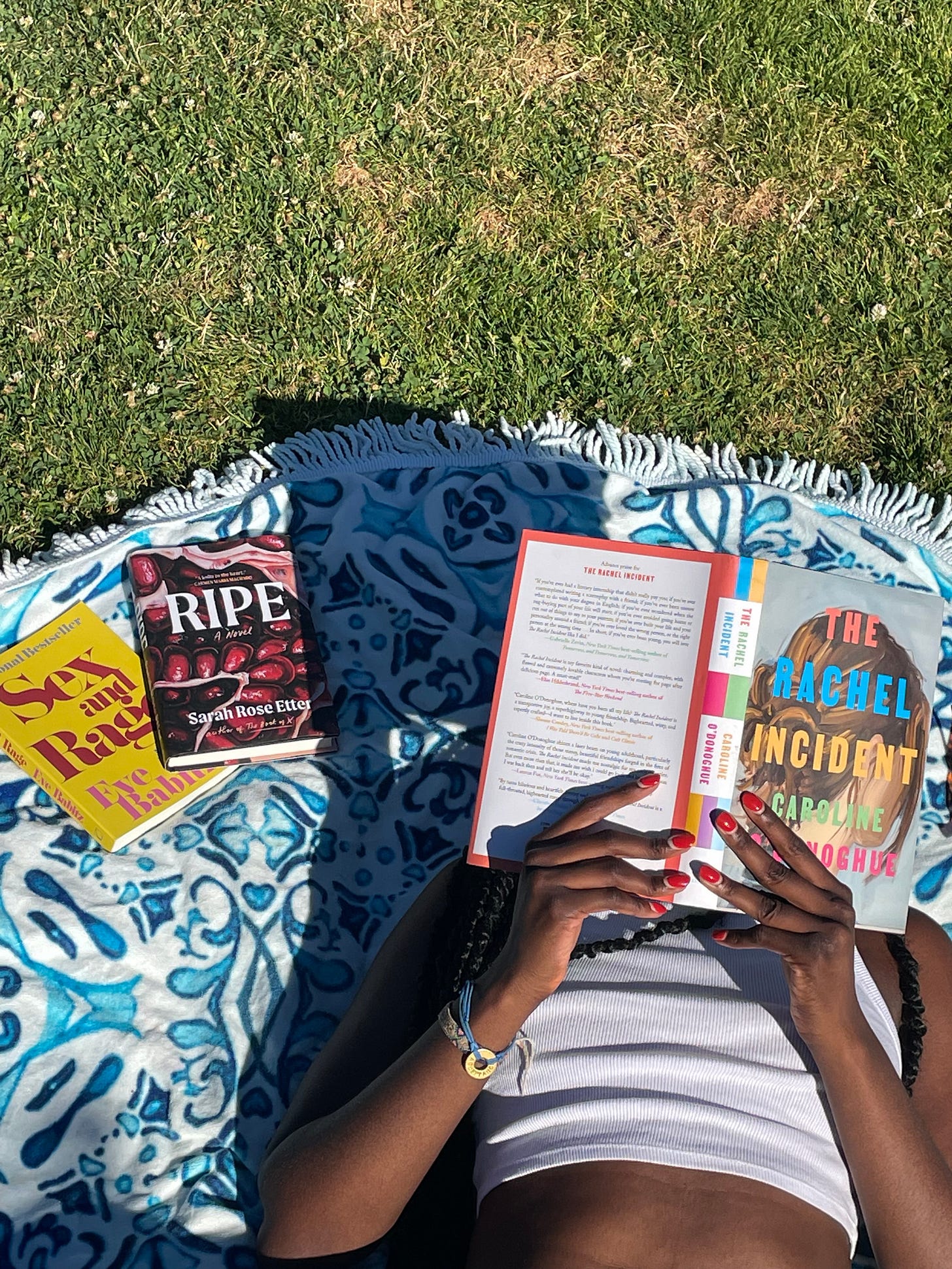

Adding Assembly to the list of things to read. Also, YES re: All Fours, the ww psyche on full display.
Brilliant reflections (AS USUAL)!! I attempted to start an Ali Smith this month and.... Well.....
Also so happy to see In the Dream House in your top 10. My favourite book of all time!